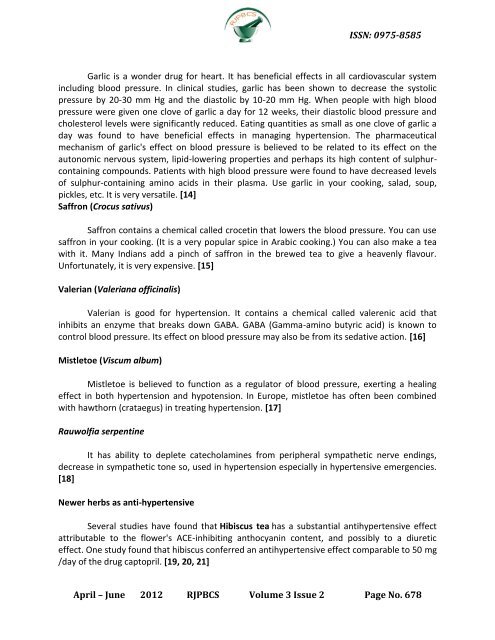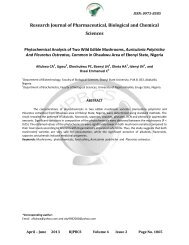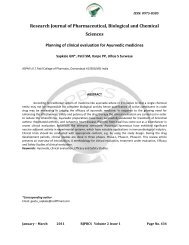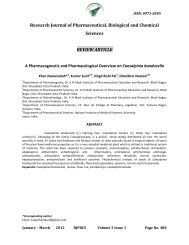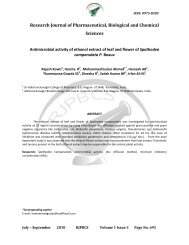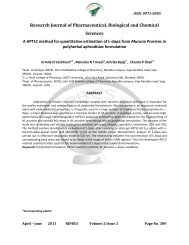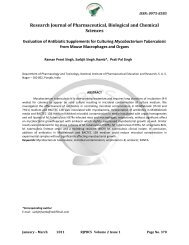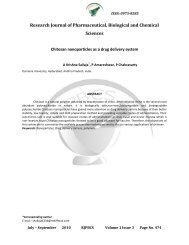Research Journal of Pharmaceutical, Biological and ... - RJPBCS
Research Journal of Pharmaceutical, Biological and ... - RJPBCS
Research Journal of Pharmaceutical, Biological and ... - RJPBCS
Create successful ePaper yourself
Turn your PDF publications into a flip-book with our unique Google optimized e-Paper software.
ISSN: 0975-8585<br />
Garlic is a wonder drug for heart. It has beneficial effects in all cardiovascular system<br />
including blood pressure. In clinical studies, garlic has been shown to decrease the systolic<br />
pressure by 20-30 mm Hg <strong>and</strong> the diastolic by 10-20 mm Hg. When people with high blood<br />
pressure were given one clove <strong>of</strong> garlic a day for 12 weeks, their diastolic blood pressure <strong>and</strong><br />
cholesterol levels were significantly reduced. Eating quantities as small as one clove <strong>of</strong> garlic a<br />
day was found to have beneficial effects in managing hypertension. The pharmaceutical<br />
mechanism <strong>of</strong> garlic's effect on blood pressure is believed to be related to its effect on the<br />
autonomic nervous system, lipid-lowering properties <strong>and</strong> perhaps its high content <strong>of</strong> sulphurcontaining<br />
compounds. Patients with high blood pressure were found to have decreased levels<br />
<strong>of</strong> sulphur-containing amino acids in their plasma. Use garlic in your cooking, salad, soup,<br />
pickles, etc. It is very versatile. [14]<br />
Saffron (Crocus sativus)<br />
Saffron contains a chemical called crocetin that lowers the blood pressure. You can use<br />
saffron in your cooking. (It is a very popular spice in Arabic cooking.) You can also make a tea<br />
with it. Many Indians add a pinch <strong>of</strong> saffron in the brewed tea to give a heavenly flavour.<br />
Unfortunately, it is very expensive. [15]<br />
Valerian (Valeriana <strong>of</strong>ficinalis)<br />
Valerian is good for hypertension. It contains a chemical called valerenic acid that<br />
inhibits an enzyme that breaks down GABA. GABA (Gamma-amino butyric acid) is known to<br />
control blood pressure. Its effect on blood pressure may also be from its sedative action. [16]<br />
Mistletoe (Viscum album)<br />
Mistletoe is believed to function as a regulator <strong>of</strong> blood pressure, exerting a healing<br />
effect in both hypertension <strong>and</strong> hypotension. In Europe, mistletoe has <strong>of</strong>ten been combined<br />
with hawthorn (crataegus) in treating hypertension. [17]<br />
Rauwolfia serpentine<br />
It has ability to deplete catecholamines from peripheral sympathetic nerve endings,<br />
decrease in sympathetic tone so, used in hypertension especially in hypertensive emergencies.<br />
[18]<br />
Newer herbs as anti-hypertensive<br />
Several studies have found that Hibiscus tea has a substantial antihypertensive effect<br />
attributable to the flower's ACE-inhibiting anthocyanin content, <strong>and</strong> possibly to a diuretic<br />
effect. One study found that hibiscus conferred an antihypertensive effect comparable to 50 mg<br />
/day <strong>of</strong> the drug captopril. [19, 20, 21]<br />
April – June 2012 <strong>RJPBCS</strong> Volume 3 Issue 2 Page No. 678


